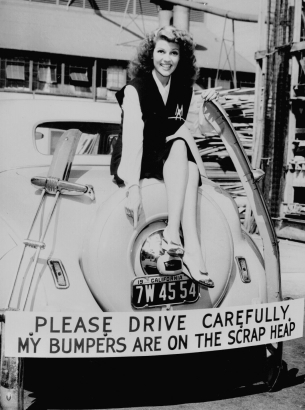In the height of the second world war, Americans were asked to donate unnecessary scrap metal to improve the US’ manufacturing war effort. House-hold names like Rita Hayworth joined the campaign to help Uncle Sam gather scrap metal. Army vessels, war planes and weapons required a massive amount of metal, including the largest US navy vessel which asked for 900 tonnes of it. As a result, metal started being rationed.
On the first day of 1942, the War Production Board put a temporary ban on automobile manufacturing. By March, dog food was no longer available in tins and by June there was a manufacturing halt on just about every appliance which required metal – refrigerators, washing machines, sewing machines, type writers, radios and phonographs. When the war ended, there were millions of tons of scrap metal discarded in junkyards around the country and, as a result of the war, scrap metal was littered all over Europe.

Rita Hayworth. Photo: Wikimedia Commons.
A photo of Rita Hayworth participating in a scrap metal drive. The original caption read: “Harvesting bumper crop for Uncle Sam. Movie star Rita Hayworth sacrificed her bumpers for the duration. Besides setting an example by turning in unessential metal car parts, Miss Hayworth has been active in selling war bonds.”
Garson Kanin’s antihero in Born Yesterday – Harry Brock – is inspired by the reality of many men who hoped to make a profit from importing European scrap metal to sell back to American manufacturers for triple the price.
The very nature of striking it rich from scrap attracted a thug-like reputation. Junk-yard tycoons or scrap metal men were often associated with racketeers and browbeaters. Harry Brock (Russell Dykstra) is a junkman who could easily be mistaken for a mobster. His entire mission in Washington DC is based on manipulating Congressmen for his own selfish gain.
At the end of the war, several laws were passed to stop war profiteering. The Excess Profits Tax was implemented to stop men like Brock from making over a certain amount of money as a result of the war. Several anti-trust Acts were also passed to stop any one businessman from owning the monopoly of an industry. Brock’s attempt to manipulate Senator Hedges in Born Yesterday, is inspired by real life events, where corruption in Congress was starting to be reported as an everyday reality.
Garson Kanin’s Born Yesterday plays at Southbank Theatre from 14 January.
Published on 13 January 2017





